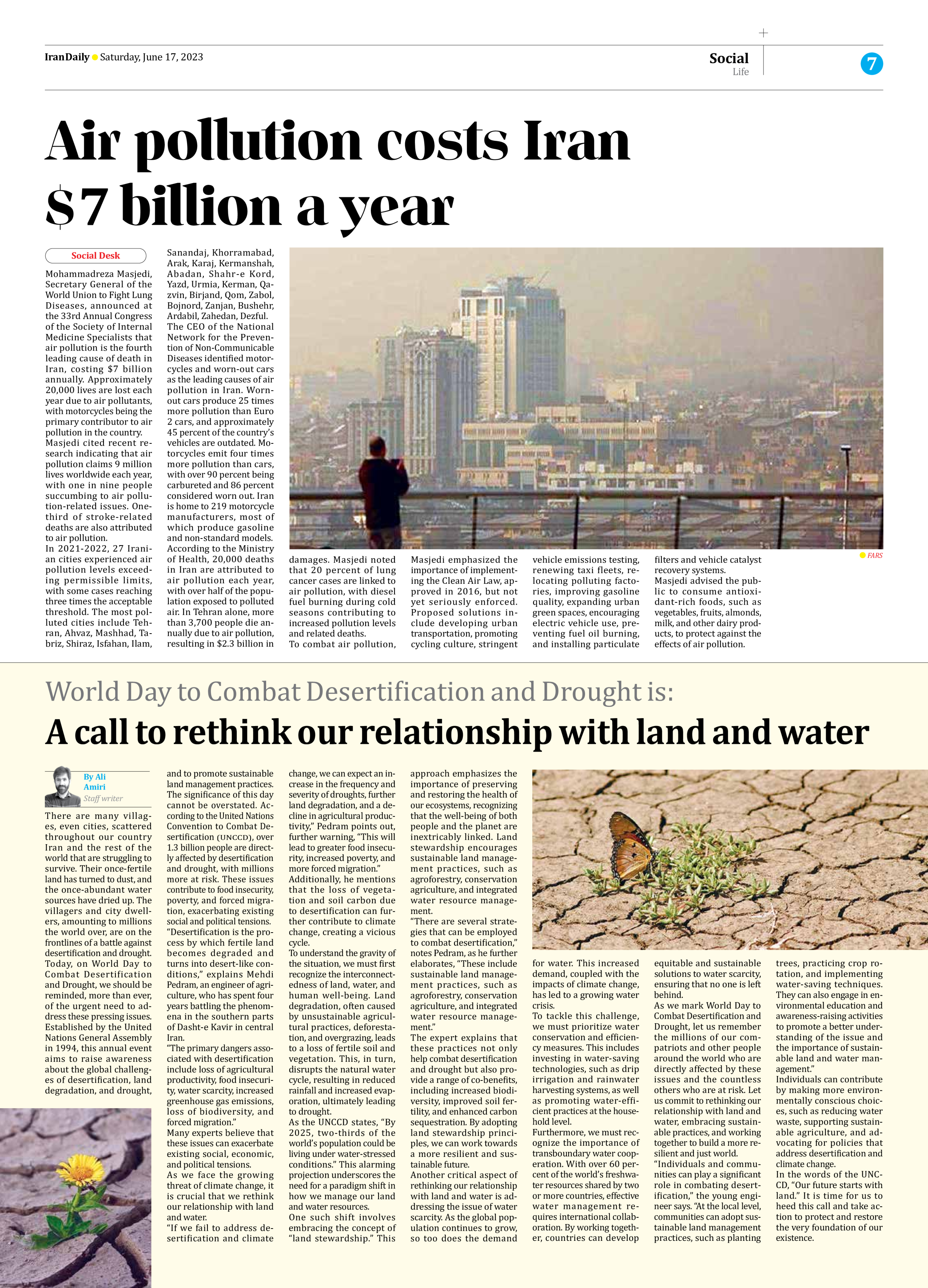
World Day to Combat Desertification and Drought is:
A call to rethink our relationship with land and water
By Ali Amiri
Staff writer
There are many villages, even cities, scattered throughout our country Iran and the rest of the world that are struggling to survive. Their once-fertile land has turned to dust, and the once-abundant water sources have dried up. The villagers and city dwellers, amounting to millions the world over, are on the frontlines of a battle against desertification and drought.
Today, on World Day to Combat Desertification and Drought, we should be reminded, more than ever, of the urgent need to address these pressing issues. Established by the United Nations General Assembly in 1994, this annual event aims to raise awareness about the global challenges of desertification, land degradation, and drought, and to promote sustainable land management practices.
The significance of this day cannot be overstated. According to the United Nations Convention to Combat Desertification (UNCCD), over 1.3 billion people are directly affected by desertification and drought, with millions more at risk. These issues contribute to food insecurity, poverty, and forced migration, exacerbating existing social and political tensions.
“Desertification is the process by which fertile land becomes degraded and turns into desert-like conditions,” explains Mehdi Pedram, an engineer of agriculture, who has spent four years battling the phenomena in the southern parts of Dasht-e Kavir in central Iran.
“The primary dangers associated with desertification include loss of agricultural productivity, food insecurity, water scarcity, increased greenhouse gas emissions, loss of biodiversity, and forced migration.”
Many experts believe that these issues can exacerbate existing social, economic, and political tensions.
As we face the growing threat of climate change, it is crucial that we rethink our relationship with land and water.
“If we fail to address desertification and climate change, we can expect an increase in the frequency and severity of droughts, further land degradation, and a decline in agricultural productivity,” Pedram points out, further warning, “This will lead to greater food insecurity, increased poverty, and more forced migration.”
Additionally, he mentions that the loss of vegetation and soil carbon due to desertification can further contribute to climate change, creating a vicious cycle.
To understand the gravity of the situation, we must first recognize the interconnectedness of land, water, and human well-being. Land degradation, often caused by unsustainable agricultural practices, deforestation, and overgrazing, leads to a loss of fertile soil and vegetation. This, in turn, disrupts the natural water cycle, resulting in reduced rainfall and increased evaporation, ultimately leading to drought.
As the UNCCD states, “By 2025, two-thirds of the world’s population could be living under water-stressed conditions.” This alarming projection underscores the need for a paradigm shift in how we manage our land and water resources.
One such shift involves embracing the concept of “land stewardship.” This approach emphasizes the importance of preserving and restoring the health of our ecosystems, recognizing that the well-being of both people and the planet are inextricably linked. Land stewardship encourages sustainable land management practices, such as agroforestry, conservation agriculture, and integrated water resource management.
“There are several strategies that can be employed to combat desertification,” notes Pedram, as he further elaborates, “These include sustainable land management practices, such as agroforestry, conservation agriculture, and integrated water resource management.”
The expert explains that these practices not only help combat desertification and drought but also provide a range of co-benefits, including increased biodiversity, improved soil fertility, and enhanced carbon sequestration. By adopting land stewardship principles, we can work towards a more resilient and sustainable future.
Another critical aspect of rethinking our relationship with land and water is addressing the issue of water scarcity. As the global population continues to grow, so too does the demand for water. This increased demand, coupled with the impacts of climate change, has led to a growing water crisis.
To tackle this challenge, we must prioritize water conservation and efficiency measures. This includes investing in water-saving technologies, such as drip irrigation and rainwater harvesting systems, as well as promoting water-efficient practices at the household level.
Furthermore, we must recognize the importance of transboundary water cooperation. With over 60 percent of the world’s freshwater resources shared by two or more countries, effective water management requires international collaboration. By working together, countries can develop equitable and sustainable solutions to water scarcity, ensuring that no one is left behind.
As we mark World Day to Combat Desertification and Drought, let us remember the millions of our compatriots and other people around the world who are directly affected by these issues and the countless others who are at risk. Let us commit to rethinking our relationship with land and water, embracing sustainable practices, and working together to build a more resilient and just world.
“Individuals and communities can play a significant role in combating desertification,” the young engineer says. “At the local level, communities can adopt sustainable land management practices, such as planting trees, practicing crop rotation, and implementing water-saving techniques. They can also engage in environmental education and awareness-raising activities to promote a better understanding of the issue and the importance of sustainable land and water management.”
Individuals can contribute by making more environmentally conscious choices, such as reducing water waste, supporting sustainable agriculture, and advocating for policies that address desertification and climate change.
In the words of the UNCCD, “Our future starts with land.” It is time for us to heed this call and take action to protect and restore the very foundation of our existence.







